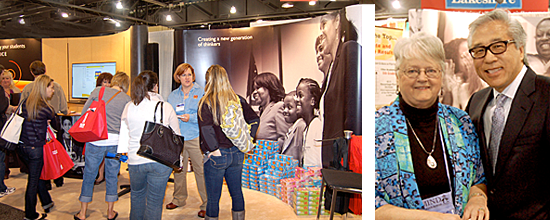PHILADELPHIA, PA-Representatives from Suntex International,
makers of the First In Math® Online Program, had a great experience
in the City of Brotherly Love at NCTM's 2012 Annual Meeting &
Exposition that began April 25. "There's always a lot of excitement
centered around the nation's largest math education event, but it
was extra-special for us to be at the Pennsylvania Convention
Center this year because it coincides with the 24th anniversary of
the release of the 24® Game," says Suntex Executive VP Nan
Ronis.

Left: Teachers talk with Staci Klemmer at the
24® Game end of the expansive FIM booth.
Right: Jeane M. Joyner, Director of Mathematics & Science
Institutes and Co-Director TAP Math at Meredith College stops to
chat with Bob Sun. Suntex worked with Joyner and Meredith College
to allow more than 100,000 North Carolina students access to FIM
through the TAP Math grant.
CEO Robert Sun grew up and attended school in Philadelphia, as
did Ronis. "Our home office is in nearby Easton, PA, and the first
large-scale implementation of our online First In Math program
began right here in the School District of Philadelphia in 2003,"
explains Ronis. (See Editor's note)
In early 2002, Sun's web-based program featured eight,
three-part modules based around core math skills covered in the 24®
Game series. Fast-forward ten years later, to the colorful First In
Math® NCTM exhibit that incorporated six Android tablets, allowing
educators to experience all 124 games the program has to offer on
two large video monitors.
Sun enjoyed the lively give-and-take with many educators
visiting the exhibit. "Educators agree that immediate feedback is
crucial in keeping students engaged and having them take ownership
of the learning process. Once energized, children are eager to put
in the time and effort to practice-which leads to mastery. FIM is
designed to provide an engaging entry point for any child,
regardless of their starting skill level. It unfolds at each
student's own pace, enabling them to see immediate progress as they
acquire increasingly more complex skills. This approach is proven
to work especially well in urban settings where other methods may
have failed." (To read more, download PDF: Urban Students Have the Grit To Succeed In
Math)
One section of the FIM exhibit paid homage to the 24® Game and
its loyal audience. "Games were going like hotcakes," laughs former
Suntex staffer Staci Klemmer. Klemmer, who currently teaches in the
Pennridge School District, uses the FIM program in the classroom,
but professes undying love for the 'game' that started it all. "The
24® Game seems so simple, but it teaches students the importance of
perseverance and flexibility. Students need to realize that they
may not get the answer immediately, but with persistence they can
solve any problem. The fact that there are often multiple solutions
to each card also encourages them to think creatively."
Suntex representatives Cred Dobson and Nancy Kane attended the
Benjamin Banneker Association dinner that was held in conjunction
with NCTM. The three-day exposition featured presentations,
workshops, and minicourses that cover all grade levels.
Editor's note: FIM was introduced in more than
2,600 third- through eighth-grade School District of Philadelphia
classrooms in 2003. One year later, the district reported a 7.4%
increase in fifth-grade students scoring at the proficient and
above level, compared with a 5.2% increase for students statewide.
Improvement for eighth graders was even more impressive: an 11.1%
increase in students scoring proficient and above, versus a 6.1%
increase statewide. In the district's Northwest Region, where the
program was most diligently implemented, fifth-grade scores
increased 15.1%-double the school district's broader increase and
three times the state average. In one school, eighth-grade results
jumped nearly 42% in a single year. Over the past nine years,
Philadelphia students have correctly solved about 948 million math
problems using the First In Math® Online deep practice program. The
result was a district-wide increase in the percentage of students
scoring proficient and above on the Pennsylvania System of School
Assessment (PSSA) tests every year, for a total gain of 39.5
percentage points.